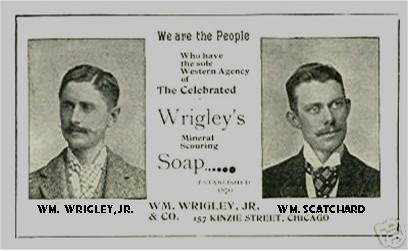Footnote #1: The one question that invariably comes up when reading the "Wrigley Connection"
is why was William Scatchard referred
to as Junior? Living uncle William Ladley Scatchard today verfies that his grandfather William S. really was known
as "junior" so it is not an error
by the author of the book, Zimmerman. Instead, we propose this explanation: William had an uncle also a
William with whom (we surmise) he
spent alot of time. Both lived in the Philadelphia area where William (the uncle) operated a woolen
mill for years with his brother Joseph B. (William junior's) father. The families undoubted co-mingled extensively. Thusly,
it only seems likely that within the family, to keep things straight, one was known as the "senior" William (the uncle) and the other
the "junior" William. The knick-name undoubtedly
stuck even though William, son of Joseph B., was not really a junior in the true sense of the word.
Footnote #2: In 1916, Wrigley purchased control of the Chicago Cubs baseball team and renamed Weeghman Park to
Cubs Park and later, in 1926, to Wrigley Field. Sixty five years later (1981) The Tribune Company bought the club from the Wrigley family for $20.5 million,
thus ended the longest continuous operation of a Major League baseball franchise by the same family in one city.
Footnote #3: The Scatchard connection did not end with William. Two more Scatchards joined
the Wrigley team when Joe B Scatchard, William's son, signed on in 1914 and worked until 1949. He became
West Coast Manager and nearly made VP of Sales when cancer cut his life short. After that, Joe B.'s second
son, William Ladley also worked for Wrigley for a short time.
